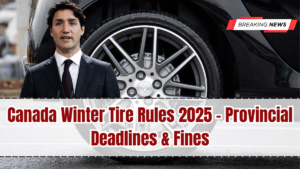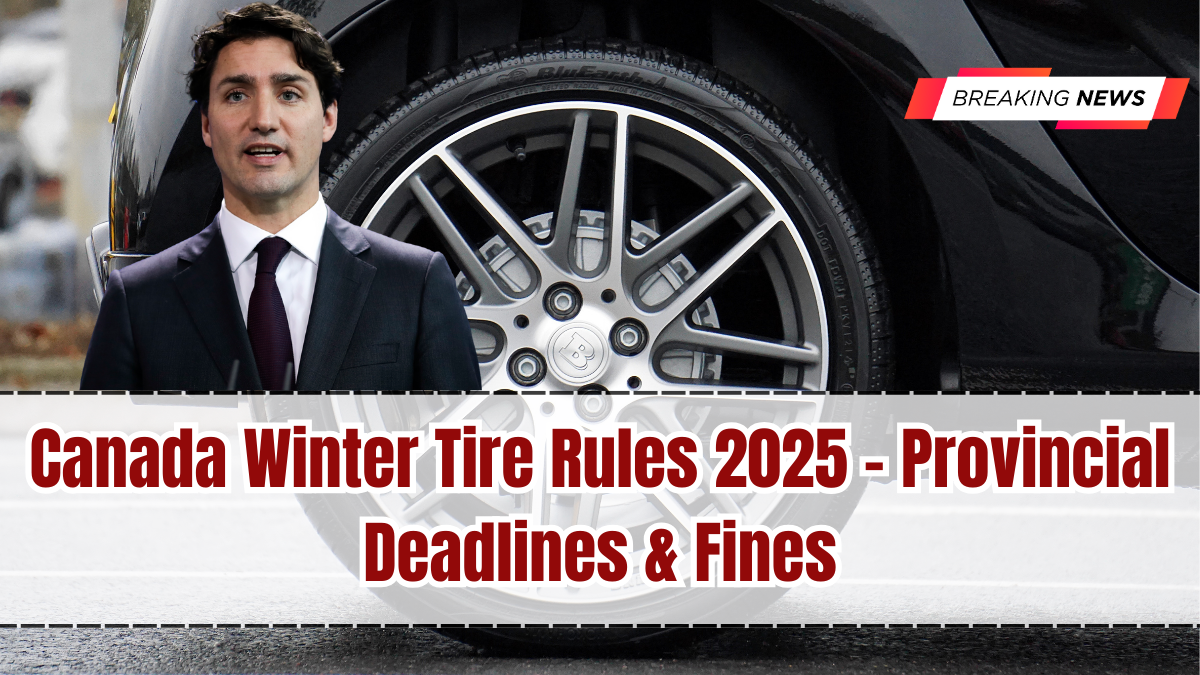Winter in Canada brings challenging road conditions, and governments across the country continue to update safety regulations to protect drivers. In 2025, several provinces have tightened their winter tire rules, particularly Quebec, Ontario, and British Columbia. These updates include stricter deadlines for installing winter tires, heavier fines for non-compliance, and more roadside enforcement. The goal is to reduce collisions, improve traction on icy roads, and ensure safer winter driving.

Why Winter Tire Rules Are Important
Canada experiences some of the harshest winters in the world, and unsafe driving conditions lead to thousands of accidents each year. Winter tires are designed with specialized rubber compounds and deeper tread patterns, providing superior grip in temperatures below 7°C. They also reduce braking distances on snow and ice. Recognizing these safety benefits, provinces have increasingly made Canada Winter Tire 2025 rules mandatory during winter months.
Quebec – The Strictest Province
Quebec has long held the strictest winter tire requirements in Canada. In **2025, the province continues to mandate that all passenger vehicles must have winter tires installed from December 1 to March 15. Drivers caught without proper tires face a minimum fine of $300 to $600, along with potential demerit points.
Authorities have also introduced random roadside checks across Quebec this year, increasing the likelihood of enforcement. Rental vehicles are also included under the regulation, ensuring visitors comply with Canada Winter Tire 2025 rules while driving in the province.
Ontario – Stricter Enforcement Measures
Ontario does not yet have a province-wide mandate requiring winter tires, but in 2025 new enforcement policies have been introduced. While winter tires remain optional, insurance providers across Ontario are now offering more substantial discounts—up to 10%—for drivers who install them. In addition, several northern municipalities such as Sudbury, Thunder Bay, and Timmins have adopted local bylaws mandating winter tires from November 15 to April 1.
Drivers in regions where bylaws apply can face fines ranging from $100 to $400 for failing to comply. Road safety campaigns in Ontario have intensified, urging drivers to follow the Canada Winter Tire 2025 guidelines even if not legally required in all areas.
British Columbia – Mountain Pass Regulations
British Columbia is another province with strict seasonal requirements. Under Canada Winter Tire 2025 rules, drivers must have winter tires (or all-weather tires with the mountain snowflake symbol) from October 1 to April 30 when traveling on designated highways, including popular mountain passes.
Failure to comply results in fines starting at $368, along with potential towing if vehicles are deemed unsafe for road conditions. The BC government has increased signage and roadside checks to ensure tourists and residents alike are properly equipped.
Other Provinces and Territories
While Quebec, Ontario, and BC lead the way with enforcement, other provinces also encourage winter tire use. Manitoba and New Brunswick provide insurance incentives for drivers who install winter tires. Saskatchewan and Alberta currently stop short of mandating them, though both recommend their use during snowy conditions. The federal government has also supported awareness campaigns across all provinces as part of Canada Winter Tire 2025 road safety initiatives.
Penalties for Non-Compliance
The fines in 2025 reflect a stronger stance on winter driving safety:
-
Quebec: $300–$600 fine and possible demerit points
-
Ontario (municipal bylaws): $100–$400 fine
-
BC: $368 fine plus towing risk
Beyond monetary penalties, drivers risk losing insurance coverage if they are found to be operating without winter tires during a collision in provinces where rules apply. This could result in thousands of dollars in out-of-pocket costs.
Financial Benefits and Insurance Discounts
While fines are a strong deterrent, financial incentives are also driving compliance. Insurance companies in Ontario, Quebec, and Manitoba offer discounts of 5–10% on premiums for vehicles equipped with winter tires. Over the course of a year, these savings can add up significantly, helping offset the cost of purchasing and installing winter tires.
Public Awareness and Driver Education
Governments are pairing fines with educational campaigns. Public service ads emphasize that Canada Winter Tire 2025 is not just about compliance but about safety. These campaigns highlight reduced stopping distances, improved handling, and the fact that all-season tires are not designed for extreme Canadian winters.
Preparing for Winter 2025
Drivers are encouraged to install winter tires early—ideally by mid-November—to avoid the rush at tire shops. Experts recommend checking tire tread depth (minimum 3.5 mm) and ensuring proper inflation. Storing summer tires correctly and rotating winter tires annually can also extend their lifespan.
With stricter deadlines and fines in place, Canada Winter Tire 2025 rules serve as a reminder that proper preparation is essential for safe winter driving.
FAQs
What are the winter tire rules in Quebec for 2025?
Quebec requires all vehicles to use winter tires from December 1 to March 15, with fines of $300–$600 for non-compliance.
Are winter tires mandatory in Ontario in 2025?
Ontario does not have a province-wide mandate, but certain northern municipalities enforce local bylaws requiring winter tires between November 15 and April 1.
When are winter tires required in British Columbia?
In BC, winter tires are mandatory from October 1 to April 30 on designated highways, with fines of $368 for violations.
Do insurance companies give discounts for winter tires?
Yes, many insurers in Ontario, Quebec, and Manitoba offer discounts of 5–10% for vehicles equipped with winter tires.
Can drivers lose insurance coverage if they ignore winter tire laws?
Yes, in provinces with mandatory rules, insurance claims may be denied if drivers are found operating without winter tires during winter months.
Click here to know more.
